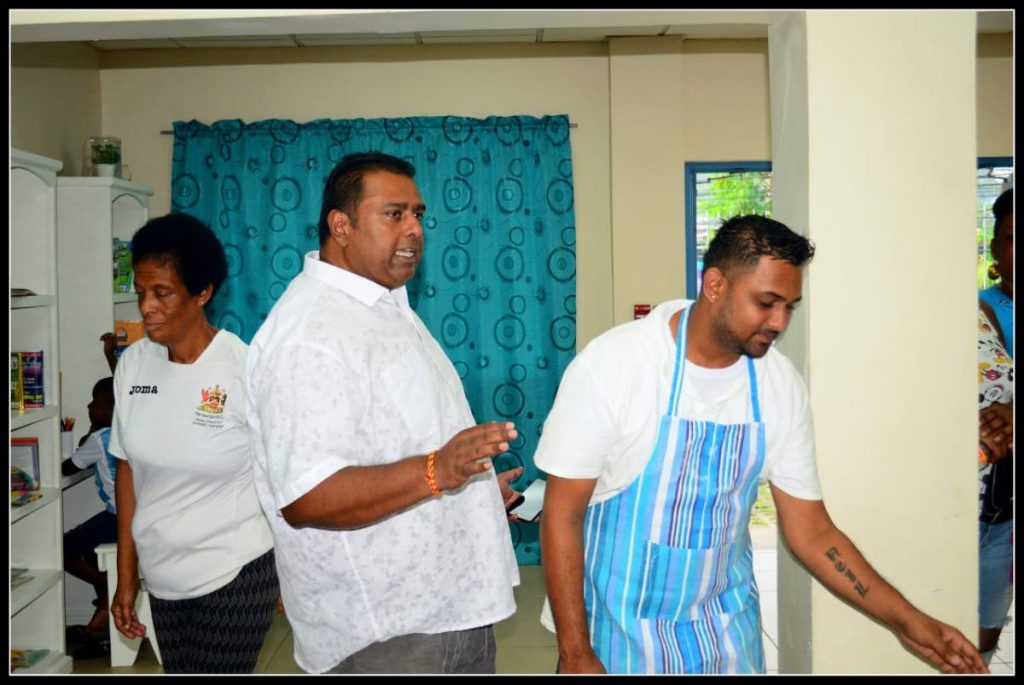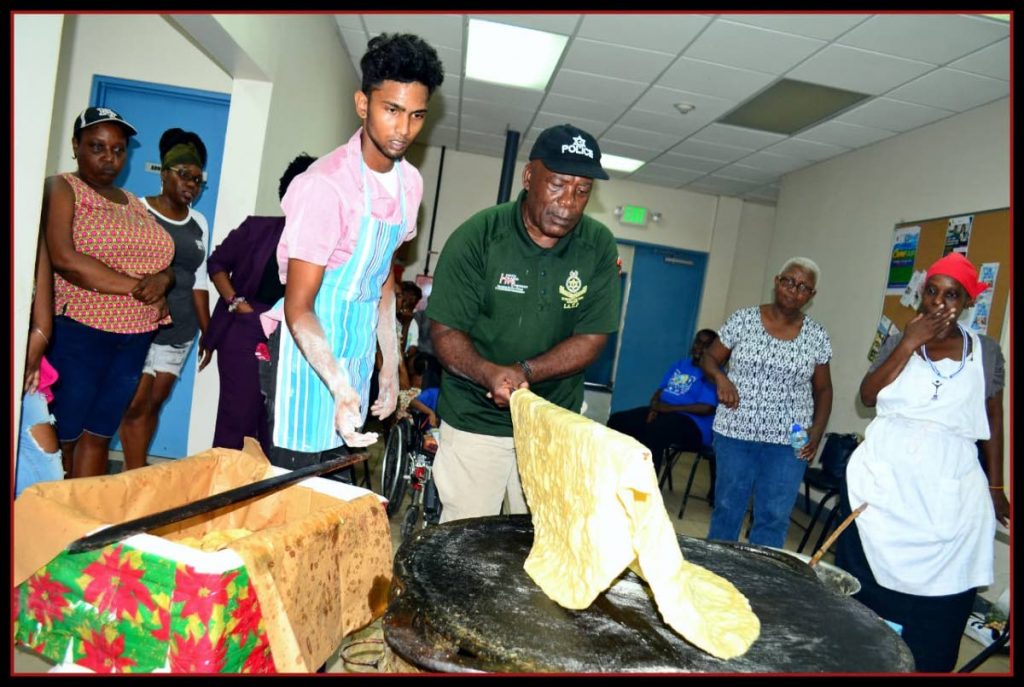Food beyond borders

AMERICAN chef Giada De Laurentiis says, “Food brings people together on many different levels. It’s nourishment of the soul and body; it’s truly love.” If that’s true, then love flowed as Debe chefs exchanged their knowledge of the art of roti-making with Beetham and Laventille residents on July 23.
This “cuisine exchange” is one aspect of the Rose Foundation’s Beyond Borders programme, which started in 2011. Its focus is on providing opportunities particularly in high-needs and high-crime communities.
The Rose Foundation’s co-founder Sterling Belgrove and businessman/entrepreneur Vijay Ramai have joined together to bring new skill sets to the people of Beetham, Laventille and environs. They came up with the idea around February this year and also came after Ramai met Belgrove as a student in his MBA class.

Ramai and his four-member team journeyed from Debe to Beetham Gardens’ Community Centre, Port of Spain where they taught about 15 people, in the first class, the art of paratha/roti-making. Ramai’s team composed of Neil Balkissoon, Nicetus Mohan, Adesh Jairaj and Mitra Rambolan.
The group of mainly women gathered around as 19-year-old chef Mohan demonstrated what it took to make the buss-up-shut.
Participants and organisers alike believe that the ten-week cuisine exchange not only taught a skill that can be monetised but also breaks down social barriers.
Kaysha Jacob of Eighth Street, Beetham Gardens, believes that for people like her the programme gives an opportunity to earn in harsh economic times.
She said, “When any holidays...coming up, we rush to buy the roti...We go out to buy the roti. Now with this programme, we see the idea and we learn, we can make the roti in here.
“It would be successful to some of us poor people. You can sell it back, instead of having to go and line up and buy. We would make some money in the area.”
Insp Reid of the Inter-Agency Task Force, with which the Rose Foundation partners for the Beyond Borders programme, as well as with BPTT, said
the programme encourages the entrepreneurial spirit and helps to bridge those divisions.

He said, “We know that people in these areas are what they call impoverished areas –not necessarily everybody, it is labelled that way – and people are constantly complaining that they are having problems getting employment. Many are turned away because of the area that they come from and that sort of thing.
“So we are saying, if we provide them with the skills, then they themselves can become entrepreneurs and be self-employed. Then it would make a big difference.”
Reid believes the programme will augur
well, not only for Beetham but for TT as a whole.
“It is great. We see it at certain times of the year, when it is either Eid or something like that, you see a lot of people run to share in the culture of people that reside in the country. I think the cultural exchange is very good. Because for me, I eat it quite a lot, but how to make it – I did not have a clue. But here I am learning it today, and you will see the facilitators are quite happy to share their culture and information with us.
“I think we will better understand each other. We look forward to this growing and spreading. Until we knock down some of the social barriers, the barriers that prevent us coming together as a people. I think this will go a long way in helping to break those barriers and we look forward to that.”
The class learned some of the Hindi words like puchara, and bilna (rolling pin) associated with roti making. The use of the language further erodes the barriers, Ramai said.
In the Monday evening class,
he saw “only laughter, joy, happiness. No animosity. No one is showing signs of not liking what they see.”
He and his team intend “to be here for as long as it takes for the people from the Beetham to be able to learn how to make it properly so they can empower themselves. And in turn monetise and become entrepreneurs in the field.”
He became involved with the Rose Foundation through Belgrove, his lecturer in the masters of Business Administration programme at the Anglia Ruskin University, UK, through the School of Accounting and Management.
“I believe in his vision and the objectives he had, and then he introduced me to some of the projects he is working on and asked me to come on board with him at the Rose Foundation and whatever ideas I could bring on. I work with my strengths in coming from south Trinidad,” Ramai said.
He believes the participants can in turn set up their own shops and become self-sufficient, since “the only thing that is needed in this job is practice.”
Ramai and his team are also introducing innovation into roti-making by adding cinnamon:. the Beetham has been the first to make cinnamon-flavoured roti/buss-up shut.
“I recognise one of my favourite tastes is cinnamon, and the process in which the roti is made, if we sprinkle the same cinnamon and cook it in that process, we will be the first people in the Beetham to make a cinnamon buss-up shut,” he said, smiling. Although the class has not made the cinnamon-flavoured roti as yet, Madonna Mc Fee-Grant believes it will do well, because “Some people have a sweet taste and some have a salt taste. The cinnamon is a great idea.”
This innovation will also lend itself to producing different types of roti skins, Ramai added, which he believes will attract more clients.
The advance part of the programme will take its participants to the Debe kitchen where they would be able to see the roti in mass production, he said.
From the programme, the participants will also learn to make spin-offs such as phoulourie, Ramai said.
The programme, Belgrove said, encourages community industry in the Beetham, since its residents would buy from the people in the community itself.
Belgrove also saw something spiritual in the cuisine exchange.
“This particular item of the roti and the buss-up-shut
is bread, and bread symbolises life. So in a sense we have two cultures breaking bread as a symbol of peace, unity, love and healing for the nation.”
Those who are interested in setting up shop and producing roti, Belgrove said, will be introduced to the small-business incubator for support. The foundation hopes also to see spin-off businesses like pluck shops developing.
The partners also hope to see much more development in the Beetham, such as yoga in the community centre, and a processing plant for live broilers.
The Rose Foundation, Belgrove and the Beyond Borders programme also want to do values-transfer between communities like Debe and Beetham, since in some communities like Debe, “It is values that has kept the community cohesive.
“Instead of engaging in activity that diminishes life, they engage in activity that enhances and preserves life. It is not about talking and saying what should be done. It is engaging the people in practical experiences and the acquisition of the skill set necessary to do what can be done,” Belgrove said.


Comments
"Food beyond borders"